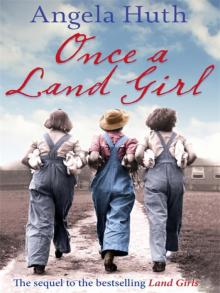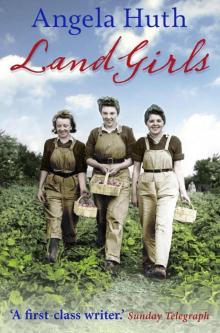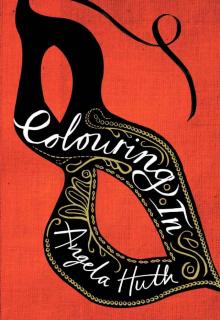- Home
- Angela Huth
Invitation to the Married Life Page 14
Invitation to the Married Life Read online
Page 14
Moments later there was a shuffling behind Thomas, and a voice that sounded rusty from lack of use, yet full of possible laughter.
‘Mr Arkwright, I presume?’
Thomas turned to see what could have been a miniature lifeboat man, almost swamped by the yellow (Indian? Cadmium?) waterproof and matching sou’wester, still concealing her eyes.
‘I’m so sorry . . . I . . . hope you didn’t mind -’
‘– glad you came in. I always leave the door open, hoping.’
Hoping what?
In a brisk movement, R. Cotterman tipped back the hat. It fell to the ground behind her. A small pointed chin rested on the high, stiff collar of the waterproof, reflecting its colour on her skin like childhood buttercups. The cheeks were the colour of sand, and grained with a million tiny lines – lines so fine that when she moved her head from the sun into shadow, they became invisible.
The eyes were the palest rims of topaz round huge black pupils – so pale as to be almost transparent, like the sky.
With the speed of light, Thomas sifted through several observations, designed to convey something of his feelings. They all seemed inadequate. Besides, it was not the time.
‘I was early, trying not to be late,’ he said.
‘What’s that, Mr Arkwright?’
R. Cotterman was pulling at the zip of the waterproof. It sliced down through the shining yellow stuff like a wire through cheese.
‘I’m afraid that due to a certain little error in the past, I’m slightly deaf. You’ll have to speak up.’
At that moment, Thomas fell in love with Rosie Cotterman – irretrievably, ecstatically, and with a strange sense of humility – a feeling so unknown, so curious, so tangible, that he felt physically stiff, and found himself kneading his hands to soften the sensation of wearing new gloves.
‘Would you like some coffee, Mr Arkwright? I keep it ready, in case.’
‘Please.’
‘And for when I come back. I like to come back to the smell of coffee.’
She was moving towards the stove, expertly avoiding all hazardous objects, a tiny figure swamped by a very large black jersey. On her way, without stopping, she picked up mugs from the muddle of things on the table, slid a packet of cigarettes from the pocket of her jeans, and pushed away a wisp of lively hair with the backs of both occupied hands. Thomas watched every movement, entranced. ‘But this new smell – smell it? Good, don’t you think? The finest turps you can get on the east coast, I’ll tell you that. However, it’s not for me. I tried an experiment this weekend – oils. Portrait of my daughter, Serena. You met her at The Gallery. Hopeless, though. Can’t do it. Won’t try again. Do you paint at all, by chance, Mr Arkwright? Sugar? Milk?’
The soft lilt in her voice, Thomas realised, was from Southern Ireland.
‘Yes, well, a little. Sugar, I mean. No milk. I paint, but I’m not a painter.’
‘Sit down, won’t you? Push things off a chair. Here: there’s room at the table. Make sure you face the window, now, if you’ve only come for a while. I’ll show you some pictures if that’s what you really want, is it? And we’ll give ourselves a glass of wine and some brown shrimps on toast. You must be hungry, all that way you’ve travelled, Mr Arkwright.’
Still as if not quite sure of his movements, Thomas sat down at the table, facing the window as instructed. Rosie Cotterman sat to one side of him.
‘So many still-lives, aren’t there?’ She indicated the clutter of things on the table. ‘They seem to arrange themselves unconsciously, but I never paint them. I don’t ever paint indoors.’
Thomas looked again and saw what she meant: the division of things, the many possibilities of composition. Then he turned his eyes to her face. The sun was bright on its beauty and its flaws.
‘Now, what is it you can be thinking of, I wonder? You don’t have the demeanour of a businessman about you at all, despite the strict suit, Mr Arkwright.’
Rosie Cotterman laughed, her face crumpling so prettily, her smile so enchanting, that Thomas’s heart doubled its pounding. He laughed, too.
‘My thoughts, I must admit, were quite irrelevant to my reason for this visit. I’ve come to buy all your pictures.’
‘All?’
‘Whatever you’ll let me take.’
‘And what were you thinking? Your eyes so far away?’
Thomas felt himself blush. ‘As a matter of fact, I was thinking about beauty,’ he said. ‘The simplicity of it. The simple conjunctions between eye, mouth, nose, cheek. So obvious when you see it, you can’t think why it’s so rare.’
‘Ah, that. I don’t look at faces much myself. I listen to voices and look at the land.’ It was plain Rosie Cotterman had no idea Thomas’s thoughts had been prompted by her own face. ‘Now, you won’t say no to brown shrimps if I put in a piece of toast, Mr Arkwright, will you?’ She was away at the stove again. ‘You’ll need something in you against the journey back.’
Thomas’s hands were no longer stiff as new gloves. He was warm, flushed from the awed beating of his heart, as happy as he could remember in his entire life. With a strange feeling of being home, he took off his strict jacket, unbuttoned his waistcoat, loosened his tie. Rosie Cotterman gave him an approving smile.
‘That’s better, now. More undone. Here, open this, will you?’
She handed him a bottle of dusty claret, her fingerprints on its sides. And two glasses. The sky curved in miniature in their sides. Thomas shuffled among the things on the table until he found a corkscrew, and set about opening the bottle with the imprecise movements of one in a dream.
‘We’ll be needing a drink to get us through the business side of things. I’m no good at business at all. You’ll have to guide me, Mr Arkwright. I’ll be putting my trust in you.’
‘How about calling me Thomas, then? No more of this Mr Arkwright, if we’re to do serious business.’
‘Very well, Thomas.’ She gave the name some thought, her head tipped to one side. ‘Thomas. I had a friend once, a Thomas. A good blunt name.’
She took two burnt pieces of toast from the Aga, and a bowl of brown shrimps from an ancient fridge. ‘But let’s have our lunch, don’t you think? Before we get down to the business. There’s all the time in the world, is there not?’
Thomas smiled with the barest shake of his head. He could not bring himself to tell her he had to leave in a couple of hours. The prospect was unbearable. He took a sip of wine, determined not to think of his departure, but to resort to his childhood habit of pretending to himself that good moments will last for ever.
Two hours and ten minutes later (his instinctive sense of punctuality having agonisingly hounded him) Thomas was on his way back to London. On the back seat of the car lay three of Rosie Cotterman’s paintings. He had insisted on paying more than the Nottingham gallery prices, having persuaded her that anything less would be taking advantage of her innocence. He would have liked to have bought many more, but feared such desire might appear greedy. Besides, a gradual acquiring of her works would mean many future visits to Norfolk.
As he drove, more slowly than usual, Thomas replayed the extraordinary visit in his mind. They had talked, over the prolonged shrimps and wine, about painting, about colour, about the quixotic skies of Norfolk so fleet of pattern and temperate of mood. Lunch over – at what exact point it had ended was unclear in Thomas’s mind – Rosie had held up picture after picture for his inspection. He had made the almost impossible choice as quickly as possible, and scribbled a quick cheque which he left folded in a mug. They drank more coffee and ate chocolate biscuits. Thomas did up his waistcoat, he remembered, at twenty-past-two. What else, he asked, did the cottage consist of?
He then immediately regretted so impertinent a question, fearing it sounded intrusive, or akin to an impatient overture. But apparently no such thought came to Rosie’s mind. She led him up a spiral staircase to the room above, the bedroom, which echoed the length of the studio beneath it. The double bed, unmade, face
d the marsh and stood beneath a skylight in the sloping roof – ‘to see the stars’. Books were piled everywhere on the floor. There was no dressing-table, no sign of make-up, mirror, twinkling slippers, the sort of things usually to be found in a woman’s bedroom. A pair of man’s striped pyjamas and a small hairbrush were among the rubble on the floor. Thomas, warm from the excellent claret, was much affected by the scene. The thought briefly flamed that he should take Rosie into the unmade bed and change his life from this day forth. But that was not what he wanted – yet. He had known the moment he saw her that seduction was not his priority. The rarity of this situation left him confused. But in the mists of his confusion one beacon burned very clearly: love. This, Thomas recognised, was the proper thing, and should be treated with the care due to such a pure sensation. Besides, he felt no torturing physical desire– only a longing, more powerful, more awful: an amorphous and indescribable yearning to give himself entirely to this strange woman.
Rosie, her back to Thomas, was looking out of the window. She said something about the funny contrast she had always lived with: the physical muddle all round her, and the absolute clarity of what she was trying to paint. Thomas put a hand on her shoulder. He hoped she would see the gesture as one of understanding, nothing more indelicate. She did. With a firmness of purpose, she patted the hand in motherly fashion before removing it. Then she suggested they should return downstairs for tea. But Thomas, whose sense of duty to his wife had ensured that his nefarious ways over the years were never discovered, admitted it was time to leave. Rosie Cotterman did not try to detain him. In contrast to her daughter’s careful packing, she thrust the three pictures into a plastic bag and carried them to the car. There was no mention of any further meeting: just a brief, polite kiss on the cheek. As he drove away Thomas had looked back, waving. But Rosie was not standing there, in the manner of most women he knew, silently grimacing. She was gone, the door shut behind her. Perhaps she had found that one of the rules of a solitary life was to put brief visitors out of mind as soon as they had gone. Visitors? Who did Rosie see?
Thomas realised, in his slow passage back along the motorway, that for all their animated talk they had exchanged no information. Rosie had made no enquiries about his wife, children, job, life. He had been equally restrained, asked only about painters and paintings. But, on reflection, Rosie had not appeared to stifle other questions: as far as Thomas could judge, they had not come to her mind. Perhaps this was another wise move on the part of the solitary: when people do arrive, to learn of their passions is of more interest than to learn of their lives.
All the same, Thomas now regretted he had lost his chance to find out more. He was filled with a sudden longing just for a few basic facts. Who was the father of Serena and what had happened to him? Were there other children? A current lover? Roots in Ireland? On reaching the outskirts of London, Thomas found himself in a frenzy of anxiety. Questions swarmed uncomfortably over him. What a fool he had been. And yet he would not have had their hours together otherwise. The very lack of curiosity about each other, their talk only of things that concerned them both, had constituted the charm of the meeting. All too often, Thomas thought, beginnings with new women were identical: a swapping of autobiographical facts (in his case, much edited) followed by a long summary of the girl’s emotional curriculum vitae. A very dull way to begin, really. The more rewarding way for two people to begin to know each other was surely to pick up clues slowly, gradually building a picture, as in the reading of a good book. But most women these days, Thomas found, were desperate for instant affection and swift commitment. They were impatient for a man, and once they found one they were then impatient for development. They had no notion that the essence of romance is to take time. And that’s how it would be with Rosie, whom he loved. . . . Slow.
Thomas looked at the car clock. He realised that if he did not hurry he would be late, and he never wanted to be late for his wife. Even overwhelmed by his feelings for Rosie, to be punctual for Rachel was a rule. He would not want to break it. Though he might, one day. He accelerated, conscious he was smiling, conscious he would have to make considerable effort, this evening, to conceal his distraction.
* * *
Ralph Cotterman had come to the end of his day’s writing. He took a mug of tea into the garden and sat on a deckchair, back to the neglected herbaceous border. Ursula had begged him to let her replant it, but he had always resisted her offers. When eventually he came around to analysing his curious stubbornness over this matter, he decided it must be because he could not bear the idea of looking daily upon something she had made him: the poignancy of her absence would be even more unbearable. The reasoning was not watertight: there was a large photograph of Ursula (with children) on the bathroom wall, a constant reminder. But the illogicality persisted in his mind, and the border remained uncared for, seldom even weeded, not a thing to please the eye. Ralph was no gardener.
Mug in one hand, pen in the other, sun agreeable upon him, Ralph contemplated the block of paper on his knee. When he was not at work, or visiting the Knoxes or the Farthingoes – enjoyable interludes that needed no accounting for – he relied on his lists of instructions to himself to provide the necessary discipline of a solitary life. He wrote now, without enthusiasm:
Ring Mother
Ring Ida
Ida was a girl he had met buying postcards in the Ashmolean last week. He was unsure just how he had found himself in the position of asking her to the cinema – it was not his custom to pick up girls at random. But she, like him, was obviously alone for the evening. Kindness, nothing more, had prevailed. They had gone to Dead Poets Society, and then to supper in an Indian restaurant – kindness again. Ralph felt it would have been churlish to deliver her to her College unfed. And the evening had not been too bad. Ida, quite pretty, spurred by the film, had talked seriously about education, then moved on to her thesis about Wagner. She suffered, like many of her generation, from over-earnestness. Ralph found earnestness tiring. Ida’s views had been unrelieved by humour; it was hard to pay full attention to all she said, an effort to respond with courteous interest. So it was a great surprise to himself when he heard his own suggestion, at the lodge gates of her College, that they might go to another film next week. He would ring her, he said. She seemed pleased.
But now the time had come for the call Ralph felt an onrush of reluctance. He would leave a message with the porter – some convincing excuse, and not ring again. There was no point.
Ring Ursula, he wrote next.
Cat?
Ring Frances
After a moment, he scratched out this last piece of advice.
He updated the list fast: things he must shop for, a train to be looked up, an American professor’s paper to be read. He finished his tea, put the mug on the grass and ran his hand through the profusion of daisies. Their petals were closing, dimming the whiteness of the lawn. Ralph realised it was quite cool now the sun had disappeared behind the mulberry tree. He hurried in to ring his mother.
‘Oh Ralphie, I’ve had such a nice afternoon,’ said Rosie Cotterman, which was a surprising start. Usually, she was economical with information about her life. ‘Such a sweet man came. Businessman, I should say. To buy a few. When are you coming down? Soon?’
‘Soon, I promise.’
Ralph rather enjoyed an occasional weekend with his mother. He chose to stay in a bed-and-breakfast place rather than sleep on the sofa in her studio, and would keep out of her way all morning while she worked. They would lunch in a pub, go for a long walk on the beach, then return to Marsh Cottage for fish stew and claret. (Years ago, she had been given five dozen cases as a farewell present from some French wine-growing lover.)
‘And how are things with you?’
‘Fine,’ said Ralph.
‘You don’t elaborate much, darling.’
‘Maybe something I’ve inherited from you.’
Rosie laughed. ‘Have you found yourself a wife yet?’
This was a regular question. She was careful to phrase it slightly differently each week, to give variety. Today there was laughter in her enquiry. Sometimes she was serious.
‘Not yet, Mother.’ Ralph had been disappointing her for so many years he was used to the dying fall in her response.
‘I hope you’re out there looking about, Ralphie.’
‘I am, I am.’
‘There must be plenty of women in Oxford.’
‘There are.’
‘But they don’t come your way?’
‘Not the right ones, no.’
‘They will. Surely to God, they will.’ This she believed. Her son could not be so different from her in that respect, handsome and genial and altogether desirable as he was. ‘But otherwise things are swimmingly, are they?’
‘Busy. I had an invitation to the Farthingoes’ ball. Frances said they’d asked you.’
‘Ah! I tore it up. Serena will be going.’
‘You should come. You might enjoy it.’
‘I doubt it. Besides, I couldn’t make my way across the country.’
‘I’d fetch you, or Bill and Mary could bring you. You can stay here. We could go together.’
‘You may have a woman by then, Ralphie. I’d not be surprised.’
‘Unlikely.’
‘I’ll think on it.’ There was a long pause. ‘This man, a Mr Arkwright, paid me very handsomely, I’d say. Three pictures. He’s coming back for more.’
‘Good. You’ve done well. All those sales at The Gallery, too.’
‘That’s where he saw them in the first place. He was a sad man, I thought. The pictures seemed to cheer him up. I must be going, darling. Things to do.’
‘I’ll ring as usual. Bye, Mother.’
Next, Ursula. Ralph settled into an armchair, hoping for a long talk. He always calculated Ursula’s movements carefully to avoid ringing her at an inconvenient time. The children should be at their homework, now: with any luck, he would not be interrupting her domestic life.

 Sun Child
Sun Child South of the Lights
South of the Lights Virginia Fly is Drowning
Virginia Fly is Drowning Of Love and Slaughter
Of Love and Slaughter Such Visitors
Such Visitors Once a Land Girl
Once a Land Girl Land Girls
Land Girls Colouring In
Colouring In Nowhere Girl
Nowhere Girl Monday Lunch in Fairyland and Other Stories
Monday Lunch in Fairyland and Other Stories Another Kind of Cinderella and Other Stories
Another Kind of Cinderella and Other Stories Invitation to the Married Life
Invitation to the Married Life Easy Silence
Easy Silence